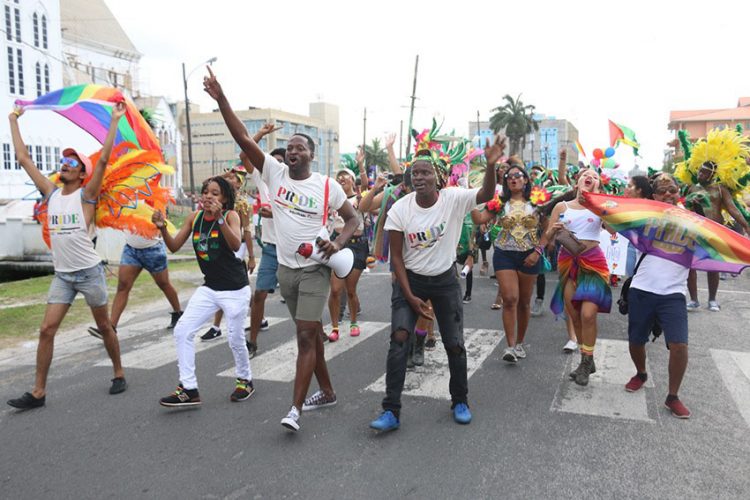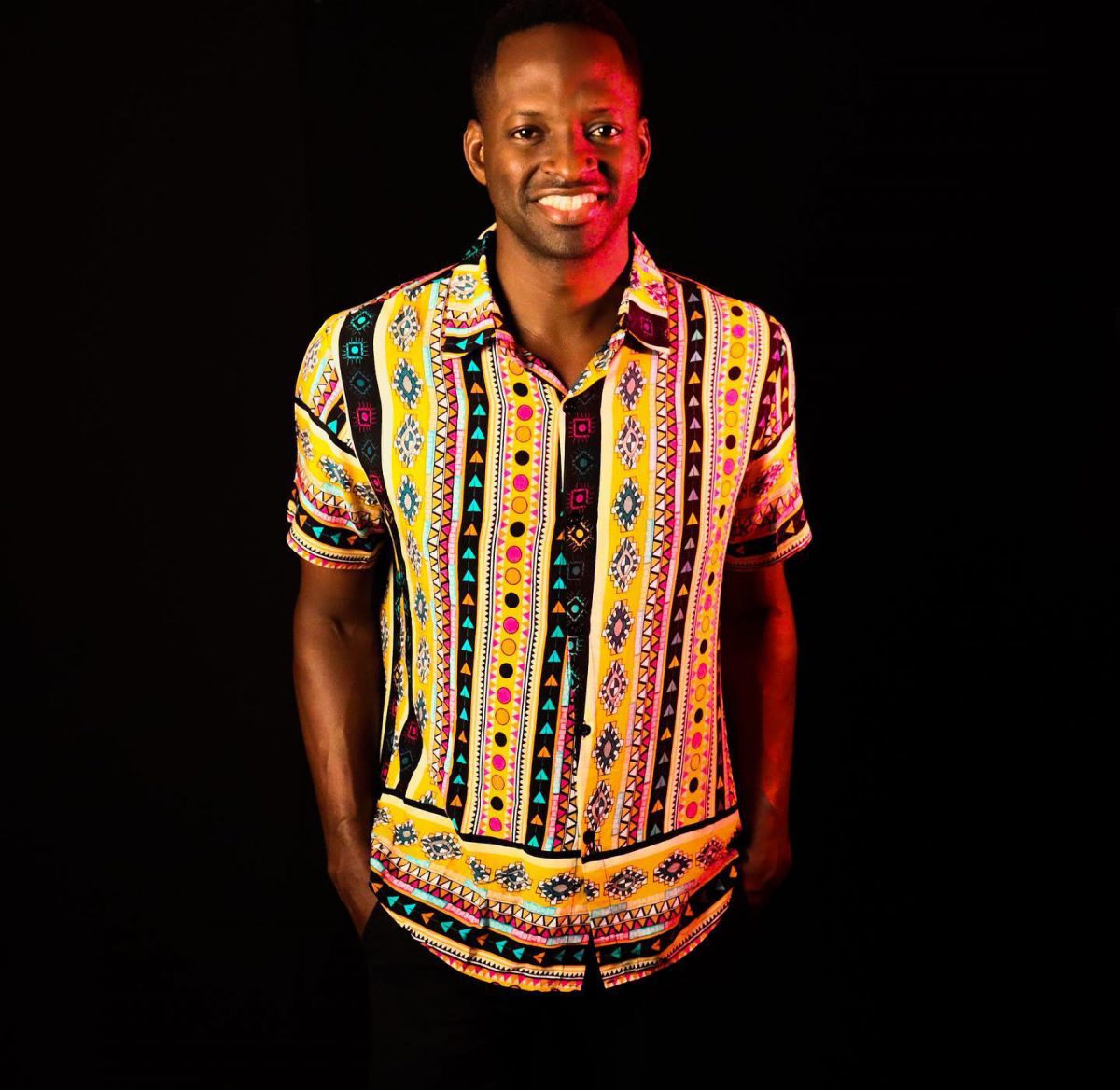With members of the lesbian, gay, bisexual, transgender (LGBT) community and their allies expected to take to the streets of Georgetown today for a pride parade, the Society Against Sexual Orientation Discrimination (SASOD) is urging the government to make tangible steps towards the decriminalisation of same-sex intimacy in Guyana.
The SASOD-organised pride parade starts at Parade Ground and will end at the square of revolution.
It is slated to begin at 14:30 hrs.

The renewed call came in light of the recent ruling by the Eastern Caribbean Supreme Court (ECSC) which saw Antigua and Barbuda’s buggery laws being struck down. That challenge was mounted by gay rights activist Orden David and the Women Against Rape Inc. (WARI) and the court ruled that the selection of an intimate partner is a private and a personal choice between same-sex consenting adults.
Section 352 of Guyana’s Criminal Law (Offences) Act states, “Any male person who, in public or private, commits, or is a party to the commission, or procures or attempts to procure the commission, by any male person, of any act of gross indecency with any other male person shall be guilty of a misdemeanour and liable to imprisonment for two years. (353) Everyone who – (a) attempts to commit buggery; or (b) assaults any person with intent to commit buggery; or (c) being a male, indecently assaults any other male person, shall be guilty of a felony and liable to imprisonment for ten years.”
Section 354 goes on to say “Everyone who commits buggery, either with a human being or any other living creature, shall be guilty of a felony and liable to imprisonment for life.”
Though there has been very little enforcement of the colonial-era anti-buggery provisions, there has been a clear and consistent call from human rights organisations and foreign missions for the government to repeal the legislation.
SASOD, which has been campaigning against the laws for close to two decades, welcomed the conclusion of the Antigua and Barbuda case, where sections 12 and 15 of the Sexual Offences Act that prohibited several acts of same-sex intimacy were deemed by the Court to be unconstitutional and discriminatory.
“SASOD Guyana emphatically celebrates with the people of Antigua and Barbuda, civil society and other partners who contributed to the success of the legal challenge,” the organisation said.
It highlighted that the Court’s decision in Antigua and Barbuda follows rulings in Belize (2016) and in Trinidad and Tobago (2018) where similar legal provisions were struck down. There are currently ongoing constitutional challenges of the same nature in St Lucia, St Kitts and Nevis and Barbados, where final rulings are expected to be handed down by the end of the year.
Additionally, SASOD said it notes that Guyana is one of the few Caribbean nations with archaic laws still on its books.
Managing Director of SASOD Guyana Joel Simpson said that they have been lobbying the government for almost two decades for the removal of the “discriminatory and dangerous laws”.
“We remain among a rapidly decreasing number of Caribbean nations that continue to allow these colonial remnants to endanger the lives of LGBTIQ+ people, in spite of the human rights implications. We hope that the Guyana government can see that this issue is now practically settled law. These provisions are discriminatory and unconstitutional, and they must go! We hope the government is encouraged to table legislation in the National Assembly to repeal similar provisions which criminalize same-sex intimacy in our law books,” Simpson said.
He added, “Caribbean courts have spoken unequivocally. Governments are elected to lead, and they must! Stop wasting time and money. Repeal the buggery law and expand anti-discrimination protections so all Caribbean peoples can live freely and fully enjoy this beautiful region.”
No place in developing Caribbean
While celebrating the ruling, Lucien Govaard, Co-Chair of the Caribbean Forum for Liberation and Acceptance of Genders and Sexualities (CariFLAGS), stated that “we reiterate that it is time governments in the region let go of these colonial structures as they have no place in a modern, diverse, and developing Caribbean.” The leader of the regional LGBTIQ+ network went on the urge regional leaders to “tackle these issues as a united region, one Caribbean, where all our peoples can live without fear, discrimination, harassment, or violence.”
Similarly, the Caribbean Sexual and Reproductive Health Rights Observatory and the Caribbean Family Planning Affiliation (CFPA) are urging Caribbean Governments to repeal discriminatory laws that continue to marginalise and infringe upon the human rights of LGBTIQ+ people and to firmly adopt and promote a culture of inclusion and respect for all people.
In a statement, the Caribbean Observatory on Sexual and Reproductive Health and Rights said that laws that criminalise same-sex relations have devastating impacts on the lives of LGBTQ+ persons. It added that LGBTQ+ people continue to face numerous challenges daily in accessing health care, housing and access to basic necessities and the right to a life free of violence – at home, school, at work and in public spaces.
ECSC relied on the Caribbean Court of Justice’s (CCJ) ruling in the case mounted by a group of Guyanese transgender women, where the CCJ found that Guyana’s law prohibiting cross-dressing violated their freedom of expression provided for under the Constitution. The law was struck down in 2018 and regarded as a landmark ruling in the protection of LGBTQ+ rights in Guyana.
Declaring Section 153 (1) (XLVII) of the Summary Jurisdiction (Offences) Act of Guyana as being unconstitutional, the CCJ had expressed the view that the law was from a different time and no longer served any legitimate purpose in Guyana, and thereby invalidated it.
In its action against the State of Guyana, the appellants—Quincy McEwan, known as Gulliver, Seon Clarke, known as Angel Clarke, Joseph Fraser, also known as Peaches Fraser, and Seyon Persaud, known as Isabella Persaud—had argued that the law discriminated against them.
The government formally removed the law from the books in August of last year. However, there was a heated debate in the National Assembly, with some Opposition Members of Parliament calling the move an affront to Christian values.
During the debate, Opposition MP Annette Ferguson said that the amendment offended her Christian beliefs. Fellow APNU+AFC MP Richard Sinclair had argued that the amendment was nothing short of a “sinful distortion of God’s gifts while arguing that God had created only males and females to each “dress appropriately.”
Ferguson had argued that “cross-dressing crosses the line of gender expression” “and sexual expression” as ordained by God while adding that the amendment creates an environment which is “ripe for anarchy and lawlessness.” She said that while citizens have a right to freedom of expression, there are limitations on those rights where they violate norms and values amounting to a transgression “of God’s laws which are supreme.”
According to activists, now that the debate had shown on which side of the fence the leaders sit, they are concerned that neither the government nor the opposition would make a step towards striking off all the discriminatory laws off the books unless it is decided by a court.
Nevertheless, foreign missions, particularly the United States, Canada, Britain and European Union, have consistently called on the government to repeal the discriminatory laws. Those missions are also constantly partnering and supporting the activities of LGBTQ+ bodies in Guyana.
A 2018 report, Trapped-Cycles of Violence and Discrimination Against Lesbian, Gay, Bisexual, and Transgender Persons in Guyana, compiled by Georgetown Law Human Rights Institute found that LGBTQ+ individuals in Guyana experience violence and discrimination across all sectors of their lives.
It found: “Starting at home and in school, LGBT children experience homophobic- and transphobic-motivated bullying, directly impacting their ability and right to access education guaranteed by the Guyanese Constitution and international human rights law. Such discrimination is perpetrated by other students, teachers, and administrators and often continues at home. Interviewees reported leaving the education system, and oftentimes their home, before finishing secondary-level education as a direct result of such discrimination and harassment.
“Lack of formal education combined with societal discrimination against those with perceived or actual non-normative SOGIE [sexual orientation, gender identity, or gender expression] make it difficult to find and keep formal-sector employment. Guyanese employment law fails to protect against discrimination on the grounds of SOGIE, thereby giving employers the discretion to discriminate. Those who do obtain formal employment are often subjected to the same discrimination and harassment described above. LGBT individuals are thus faced with the difficult decision of staying in a hostile work environment or risking unemployment – which leads to poverty and further rights violations.”
It also said that LGBTQ+ persons reported discrimination and breaches of confidentially in the healthcare sectors, especially relating to their HIV status.
The report made a number of recommendations to the government to better the lives of LGBTQ+ persons in Guyana.






